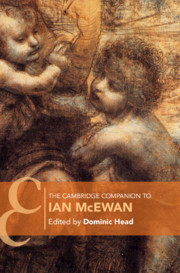Book contents
- The Cambridge Companion to Ian McEwan
- The Cambridge Companion to Ian McEwan
- Copyright page
- Contents
- Contributors
- Chronology
- Abbreviations
- Introduction
- 1 ‘Shock Lit’
- 2 Moral Dilemmas
- 3 Science and Climate Crisis
- 4 The Novel of Ideas
- 5 Cold War Fictions
- 6 The Construction of Childhood
- 7 The Public and the Private
- 8 Masculinities
- 9 The Novellas
- 10 Realist Legacies
- 11 Limited Modernism
- 12 Narrative Artifice
- Further Reading
- Index
- Cambridge Companions To…
Introduction
Published online by Cambridge University Press: 24 June 2019
- The Cambridge Companion to Ian McEwan
- The Cambridge Companion to Ian McEwan
- Copyright page
- Contents
- Contributors
- Chronology
- Abbreviations
- Introduction
- 1 ‘Shock Lit’
- 2 Moral Dilemmas
- 3 Science and Climate Crisis
- 4 The Novel of Ideas
- 5 Cold War Fictions
- 6 The Construction of Childhood
- 7 The Public and the Private
- 8 Masculinities
- 9 The Novellas
- 10 Realist Legacies
- 11 Limited Modernism
- 12 Narrative Artifice
- Further Reading
- Index
- Cambridge Companions To…
Summary
Ian Russell McEwan (1948– ) holds a pre-eminent place in late twentieth-century and contemporary British fiction. His standing as one of the most significant British writers since the 1970s is well established, and the interest in his work extends beyond Britain, especially to the United States and Europe, where he is widely read (and studied): his works have received both popular and critical acclaim, and he is, apart from Salman Rushdie (1947– ), perhaps the most truly international author among his peers, the novelists of his generation, born in the 1940s: Martin Amis (1949– ), Julian Barnes (1946– ), Graham Swift (1949– ). The larger underlying claim, which this Companion explores in its different facets, is that McEwan is at the forefront of a group of novelists who reinvigorated the ethical function of the novel, in ways that embody a deep response to the historical pressures of the time. Indeed, from the perspective of literary history, McEwan occupies a central role in a new wave of British novelists whose mature writing began to emerge in the Thatcher era, all of whom found different ways to address the moral problems that presented themselves in Britain from the late 1970s through to the 1990s, a period characterized broadly by the growth of self-interest, the expansion of corporate power and the collapse of the Welfare State.
- Type
- Chapter
- Information
- The Cambridge Companion to Ian McEwan , pp. 1 - 13Publisher: Cambridge University PressPrint publication year: 2019
- 1
- Cited by

